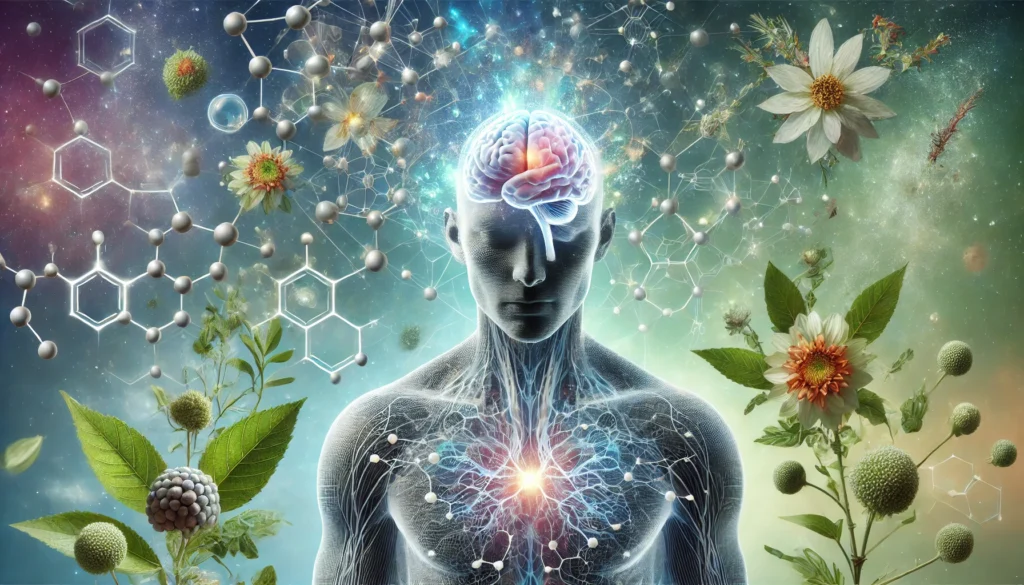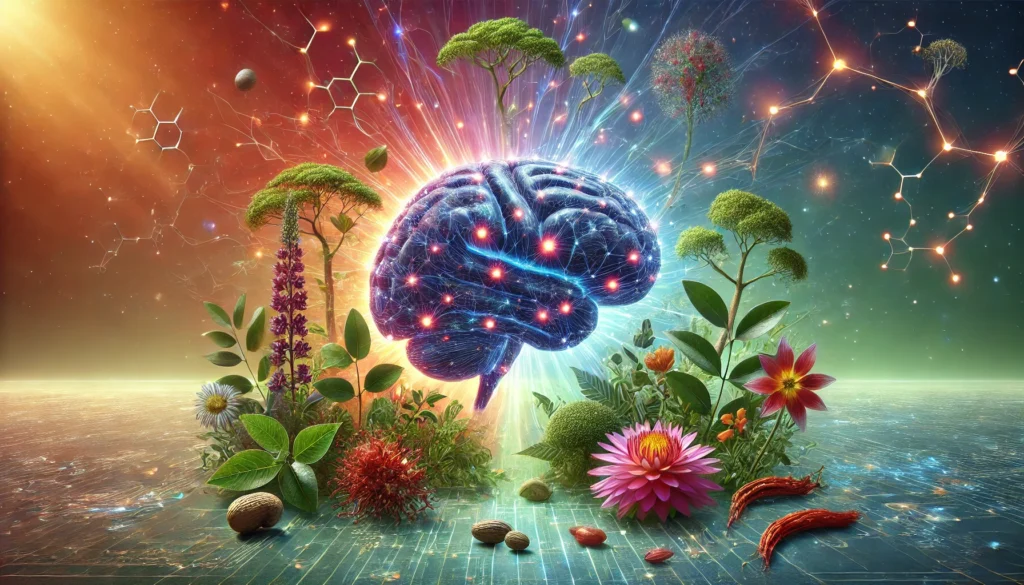Understanding Adaptogen Nootropics and Their Unique Benefits
In an era where cognitive performance and mental resilience are more important than ever, adaptogen nootropics have emerged as a powerful tool for enhancing brain function and reducing stress. These natural compounds combine the benefits of nootropics—substances known for their ability to improve cognitive abilities—with adaptogens, which help the body resist physical, emotional, and environmental stressors. By working in synergy, nootropics and adaptogens provide a holistic approach to mental clarity, focus, and overall well-being.
You may also like: The Sleep-Inducing Effects of Chicken
Adaptogen nootropics work by modulating the hypothalamic-pituitary-adrenal (HPA) axis, which plays a crucial role in stress regulation. They help normalize cortisol levels, improve neurotransmitter balance, and enhance mitochondrial function, ultimately leading to improved cognitive performance and greater emotional stability. Unlike synthetic stimulants that provide a short-term boost followed by an inevitable crash, adaptogen nootropics promote sustained mental energy and resilience without adverse side effects.
The Science of Nootropics: Cognitive Enhancement and Neuroprotection
Nootropics, also known as smart drugs or cognitive enhancers, have gained popularity due to their ability to enhance memory, focus, and mental clarity. They work through various mechanisms, such as increasing neurotransmitter availability, promoting neurogenesis, and protecting neurons from oxidative stress. Some of the most well-researched nootropic compounds include racetams, cholinergics, and natural plant-based extracts that support brain health over the long term.
The brain requires a delicate balance of neurotransmitters such as acetylcholine, dopamine, and serotonin to function optimally. Nootropics support this balance by enhancing neurotransmitter synthesis, increasing receptor sensitivity, and reducing neuroinflammation. Many nootropics also improve cerebral blood flow, ensuring that neurons receive the oxygen and nutrients they need to function efficiently. As a result, they contribute to better learning capacity, sharper problem-solving skills, and increased mental endurance.

The Role of Adaptogens in Stress Management and Cognitive Health
Adaptogens are a unique class of herbal substances that help the body adapt to stress and maintain homeostasis. Unlike conventional stimulants, which can lead to dependency and burnout, adaptogens provide a balanced approach to stress management by modulating cortisol levels and supporting adrenal health. This results in improved energy levels, reduced fatigue, and enhanced cognitive function without the risk of overstimulation.
Many adaptogens have been used in traditional medicine for centuries, with scientific research now validating their effectiveness. Herbs such as Rhodiola rosea, Ashwagandha, and Panax ginseng have been shown to reduce stress-induced cognitive decline, improve mood, and enhance resilience to mental fatigue. These adaptogens work by influencing the HPA axis, reducing oxidative stress, and regulating key neurotransmitters involved in mood and cognition.
Key Adaptogen Nootropics and Their Mechanisms of Action
Rhodiola Rosea: The Endurance Booster
Rhodiola rosea is one of the most well-researched adaptogen nootropics, known for its ability to enhance mental performance and physical endurance. Studies have shown that Rhodiola helps reduce fatigue, improve concentration, and support neuroprotection. It works by modulating the levels of stress hormones and enhancing mitochondrial efficiency, leading to increased energy production at the cellular level.
Ashwagandha: The Stress-Relief Powerhouse
Ashwagandha (Withania somnifera) is an adaptogen that has been widely studied for its stress-reducing and cognitive-enhancing properties. It has been shown to lower cortisol levels, improve reaction time, and enhance memory formation. Additionally, Ashwagandha has neuroprotective effects that support long-term brain health by reducing oxidative stress and inflammation in neural tissues.
Panax Ginseng: The Cognitive Enhancer
Panax ginseng is a well-known adaptogen nootropic that has been used in traditional medicine for centuries. It enhances cognitive function by promoting neurogenesis, improving blood circulation in the brain, and supporting neurotransmitter balance. Ginsenosides, the active compounds in Panax ginseng, have been shown to reduce mental fatigue and support overall cognitive resilience.
The Synergistic Effects of Combining Nootropics and Adaptogens
When combined, nootropics and adaptogens create a powerful synergy that enhances cognitive function while simultaneously mitigating the negative effects of stress. This makes them ideal for individuals seeking sustained mental clarity, productivity, and emotional stability. The combination of nootropics and adaptogens is particularly beneficial for students, professionals, and individuals facing high-pressure environments that demand optimal brain performance.
For example, combining Rhodiola rosea with a choline source such as Alpha-GPC can enhance memory and learning capacity while reducing stress-induced cognitive decline. Similarly, pairing Ashwagandha with L-theanine can provide a balanced approach to relaxation and focus, helping individuals maintain peak performance without feeling overstimulated.

Frequently Asked Questions (FAQ) on Adaptogen Nootropics
What makes adaptogen nootropics different from traditional nootropics?
Adaptogen nootropics offer a unique blend of cognitive enhancement and stress resilience, setting them apart from conventional nootropics. While traditional nootropics primarily focus on improving cognitive function—such as memory, focus, and learning—adaptogen nootropics provide the added benefit of helping the body adapt to stress. This dual-action effect makes them particularly valuable for individuals who experience cognitive fatigue due to chronic stress or high-pressure environments. By regulating the hypothalamic-pituitary-adrenal (HPA) axis, they help maintain balanced cortisol levels, ensuring sustained mental clarity without overstimulation. This makes nootropics and adaptogens a preferred choice for individuals seeking long-term cognitive wellness rather than short-lived boosts in performance.
How do nootropics and adaptogens complement each other in cognitive enhancement?
Nootropics and adaptogens work synergistically by addressing different aspects of brain health. Nootropics enhance neurotransmitter function, increase cerebral blood flow, and promote neurogenesis, directly supporting cognitive processes such as learning and memory retention. Adaptogens, on the other hand, help the body manage stress, prevent adrenal fatigue, and stabilize mood, reducing the cognitive impairments that stress can induce. This combination ensures that users not only experience sharper cognitive function but also maintain mental resilience under stressful conditions. For instance, pairing Rhodiola rosea with a choline-based nootropic enhances cognitive endurance while simultaneously reducing the effects of mental fatigue. This balanced approach makes adaptogen nootropics particularly effective for students, professionals, and individuals with demanding lifestyles.
Can adaptogen nootropics improve long-term brain health?
Yes, adaptogen nootropics contribute to long-term brain health by providing neuroprotective benefits that safeguard cognitive function as we age. Many adaptogens, such as Ashwagandha and Panax ginseng, possess antioxidant properties that combat oxidative stress—a major factor in neurodegenerative diseases like Alzheimer’s and Parkinson’s. Additionally, these compounds support mitochondrial function, ensuring that brain cells receive optimal energy for sustained performance. Unlike stimulants that provide only temporary cognitive boosts, adaptogen nootropics work at a cellular level to enhance synaptic plasticity and prevent cognitive decline. Over time, their ability to regulate inflammation, support neurotransmitter balance, and enhance stress resilience leads to improved brain longevity and overall mental well-being.
Are there any side effects associated with adaptogen nootropics?
While adaptogen nootropics are generally well-tolerated, some individuals may experience mild side effects depending on the specific compounds used and their unique physiological responses. Common side effects may include mild digestive discomfort, headaches, or slight changes in energy levels, especially when first introducing these supplements. Certain adaptogens, such as Panax ginseng, can have a stimulating effect and may cause sleep disturbances if taken too late in the day. It is always advisable to start with lower doses and gradually increase intake while monitoring how your body responds. Consulting a healthcare professional before integrating nootropics and adaptogens into your routine is especially important for those with existing health conditions or who are taking medications that may interact with these compounds.
What is the best time of day to take adaptogen nootropics?
The optimal time to take adaptogen nootropics depends on their specific effects and the individual’s daily schedule. Adaptogens such as Rhodiola rosea and Panax ginseng are best taken in the morning or early afternoon, as they can provide energy-boosting effects that improve mental alertness throughout the day. Conversely, adaptogens like Ashwagandha and Bacopa monnieri are better suited for evening use due to their calming properties that support relaxation and sleep. When combining nootropics and adaptogens, it is important to consider how each component influences circadian rhythms and energy levels. For individuals using multiple adaptogen nootropics, splitting doses between morning and evening can provide balanced cognitive benefits while avoiding overstimulation or fatigue.
Can adaptogen nootropics help with anxiety and mood disorders?
Yes, adaptogen nootropics can play a significant role in alleviating anxiety and mood disorders by stabilizing stress hormones and supporting neurotransmitter function. Adaptogens like Ashwagandha have been clinically studied for their ability to lower cortisol levels, which can reduce the physiological impact of chronic stress. Additionally, nootropics such as L-theanine and Bacopa monnieri help modulate levels of serotonin and dopamine, which are key neurotransmitters involved in mood regulation. This balanced approach makes adaptogen nootropics a valuable tool for individuals looking to manage anxiety without the side effects associated with pharmaceutical interventions. However, while they provide natural support for emotional well-being, they should not be used as a replacement for professional medical treatment when dealing with severe anxiety or mood disorders.
How do adaptogen nootropics impact sleep quality?
Adaptogen nootropics can improve sleep quality by addressing stress-related insomnia and promoting relaxation. Certain adaptogens, such as Ashwagandha and Reishi mushroom, have been shown to lower cortisol levels, which can make it easier to fall asleep and maintain deep sleep cycles. Nootropics like L-theanine promote alpha brain wave activity, leading to a state of calm focus that can help transition the mind into restful sleep. For individuals who experience sleep disturbances due to stress or an overactive mind, using a blend of calming adaptogen nootropics before bedtime can support healthier sleep patterns. However, stimulating adaptogens like Rhodiola rosea should be avoided in the evening, as they can interfere with the natural winding-down process needed for restful sleep.
Are adaptogen nootropics safe for long-term use?
Most adaptogen nootropics are considered safe for long-term use when taken in appropriate dosages, as they work by promoting balance within the body rather than overstimulating or suppressing physiological functions. However, cycling these supplements—taking breaks periodically—can help prevent tolerance buildup and maintain their effectiveness. For instance, some users follow a cycle of taking adaptogen nootropics for six weeks followed by a one- or two-week break. This approach allows the body to reset and ensures sustained benefits without desensitization. While adaptogens and nootropics generally support long-term brain health, individuals should regularly assess their personal responses and adjust their regimen accordingly.
Can athletes and fitness enthusiasts benefit from adaptogen nootropics?
Absolutely. Adaptogen nootropics provide significant benefits for athletes and fitness enthusiasts by enhancing physical endurance, mental focus, and recovery. Adaptogens like Rhodiola rosea have been shown to improve oxygen utilization and reduce exercise-induced fatigue, allowing for longer and more effective workouts. Additionally, nootropics like Alpha-GPC support neuromuscular function, improving coordination and reaction times. Post-exercise recovery is also enhanced, as adaptogens help regulate cortisol levels and reduce inflammation, speeding up muscle repair. By combining nootropics and adaptogens, athletes can achieve greater performance while maintaining overall stress resilience, ensuring that both their body and mind are operating at peak efficiency.
How can beginners start incorporating adaptogen nootropics into their routine?
For beginners, the best approach is to start with a single adaptogen nootropic and gradually assess its effects before introducing additional compounds. Choosing a well-researched adaptogen, such as Ashwagandha for stress reduction or Rhodiola rosea for energy enhancement, allows users to experience the benefits without overwhelming their system. It’s also advisable to begin with lower doses and monitor cognitive and physiological responses over time. Additionally, tracking mental clarity, focus, mood, and sleep quality in a journal can help identify the most effective combination of nootropics and adaptogens for individual needs. With consistent use and mindful adjustments, individuals can tailor their regimen to optimize cognitive performance and stress resilience in a way that aligns with their unique lifestyle goals.

Conclusion: The Future of Adaptogen Nootropics in Cognitive Wellness
The integration of adaptogen nootropics into daily health regimens represents a promising approach to cognitive enhancement and stress management. By leveraging the natural benefits of nootropics and adaptogens, individuals can achieve sustained mental clarity, emotional resilience, and overall well-being. Unlike synthetic cognitive enhancers that come with potential risks, adaptogen nootropics offer a safe and effective solution for optimizing brain function.
As research continues to uncover new insights into the mechanisms behind these compounds, the future of cognitive enhancement looks increasingly promising. Whether used to support academic performance, workplace productivity, or overall mental health, adaptogen nootropics are poised to become a cornerstone of holistic cognitive wellness. For those seeking a natural and sustainable way to enhance mental performance, the strategic use of adaptogen nootropics offers a scientifically backed path to long-term brain health and vitality.
Further Reading:
The No BS Guide to Adaptogens for Hormonal Balance and Stress
Plant-derived nootropics and human cognition: A systematic review
How adaptogens influence cognitive-mental performance: an integrative review
brain health, cognitive enhancement, stress relief supplements, herbal brain boosters, memory support, mental clarity, neuroprotective herbs, brain function optimization, stress management techniques, nootropic supplements, adaptogenic herbs, focus and concentration, anxiety relief supplements, natural cognitive enhancers, brain-boosting plants, mind wellness, holistic brain health, cognitive resilience, mood support supplements, brain fatigue recovery
.Important Note: The information contained in this article is for general informational purposes only, and should not be construed as health or medical advice, nor is it intended to diagnose, prevent, treat, or cure any disease or health condition. Before embarking on any diet, fitness regimen, or program of nutritional supplementation, it is advisable to consult your healthcare professional in order to determine its safety and probable efficacy in terms of your individual state of health.
Regarding Nutritional Supplements Or Other Non-Prescription Health Products: If any nutritional supplements or other non-prescription health products are mentioned in the foregoing article, any claims or statements made about them have not been evaluated by the U.S. Food and Drug Administration, and such nutritional supplements or other health products are not intended to diagnose, treat, cure, or prevent any disease.


